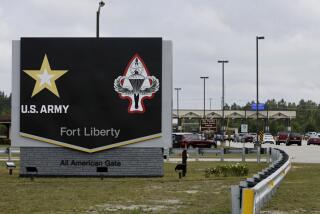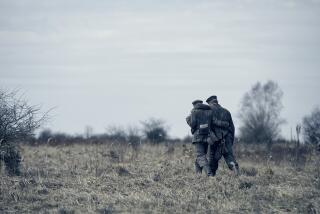War Debate Sours U.S.-German Goodwill at Base
- Share via
FT. BLISS, Texas — For 35 years, there has been a single permanent force of foreign troops on U.S. soil, here on the western tip of Texas, home of the largest air defense training center in the world and the permanent home of Germany’s Air Force Command.
On joint training exercises, over Pilseners at the Soldatenstube pub, the two forces have coalesced as partners, a proud emblem of post-World War II alliances.
But the war against Iraq is beginning to weaken that cherished solidarity. As Germany’s opposition to the war has grown increasingly strident and as the mood here plunges with word that Iraqis have killed or captured at least 15 Ft. Bliss soldiers, the troops are suddenly viewing each other with a wary, distant eye. After all these years, they are -- once again -- strangers more than allies.
The changes are subtle. There are no brawls in the street, and publicly, military officials on both sides downplay the tension, or deny that it exists.
But privately, some military personnel at Ft. Bliss grumble about the irony of welcoming German troops, only to watch them lay down their arms when America went to war.
“It’s shocking,” Eric Hildreth, a Department of Defense official who oversees sports programs at Ft. Bliss, said of Germany’s opposition to the war. “It really is.”
German military officials say their airmen have come to them in recent weeks with complaints that American soldiers -- loudly and publicly -- have questioned their courage. Some German and American families that have lived as neighbors for years are suddenly not speaking to one another.
“You wouldn’t believe it,” said Skip Stoltenberg, an El Paso resident who was born in Germany and immigrated to the United States in 1948 after marrying an American Army officer. “I don’t understand this standoff.”
Ilse Irwin, 73, was born in Wiesbaden, Germany, near Frankfurt, and immigrated to the United States as a Fulbright scholar in 1954. A practicing Catholic, the retired University of Texas-El Paso professor devotes much of her time to fighting hatred and genocide, largely by working with the area’s Jewish community.
Irwin volunteers at the local Holocaust museum, and lately she has steeled herself every time she has had to guide German airmen through an exhibit or take them on a tour of a local temple.
Repeatedly, she said, they have been hostile about her work. Some have raised questions about the United States’ agenda and suggested that the motivation for the war is oil and the close relationship between the U.S. and Israel -- a common charge in Western Europe.
“I’ve had a terrible time,” she said. “They say that Israelis are just modern-day Nazis. I defend Israel, but I get very nervous because I don’t want to blow my cool. I don’t hear it too often. But I hear it often enough.”
The tensions in El Paso are real enough to penetrate her dreams. One recent night, she dreamed that the FBI was interrogating her because of her friendship with both Jews and German commanders. In her dream she was being deported.
Ft. Bliss, built before the days of Pancho Villa as a cavalry outpost to protect the border, became the U.S. Army’s air defense center during World War II. With increased attention focused on the Middle East, Ft. Bliss’ desert conditions and surrounding military bases -- particularly the White Sands Missile Range and Holloman Air Force Base -- have increased the post’s importance to both the United States military and its allies.
Thirty-one allied nations train here, said Ft. Bliss spokeswoman Jean Offutt. Only Germany, however, has used American facilities to house permanent military installations. German officials say they reap a number of benefits from being in Texas, from the ease of purchasing U.S. weapons systems to the arid weather.
German troops have their own school, church and social club, and they have long forged friendships with American residents and military officials. Postings to Ft. Bliss, which often last three years, are seen as plum assignments, leading some Germans to break their ties with the military and move to El Paso permanently.
Many German families become taken with the culture of the Southwest; several German airmen are so enamored with Texas that they’ve become proficient rodeo riders.
The vibrant German community sponsors several popular events each year, particularly an annual Oktoberfest. American and German troops join together for this beer-soaked festival each fall that includes repeated renditions of the “Der Ententanz,” a German step that has become known across the United States as the “chicken dance.”
Germans say they enjoy El Paso’s sunshine and climate -- the same attributes that help make Ft. Bliss a better training ground than wet, blustery Central Europe. A local joke on both sides is that Ft. Bliss helped invent the Patriot missile system but also invented the tan German.
“Many of them return over and over again,” Offutt said. “It’s a lifestyle that is very different for them. And they love it.”
Even among European nations whose leaders have denounced the war as reckless and unnecessary, however, Germany’s opposition has been vociferous. German Chancellor Gerhard Schroeder has called the U.S.-led invasion “the wrong decision.” One sign carried by a protester last week at Berlin’s Brandenburg Gate read: “Stupid war; Mindless violence.” Some restaurants in Germany have removed American products, such as Budweiser and Coca-Cola, from their menus, and several businesses, including a German bicycle maker, have canceled contracts with American suppliers.
The tension has escalated in America too. In Tennessee, one high school canceled a student-exchange program with a German school, citing Germany’s opposition to the war.
Traditionally, military personnel have learned to make a distinction between a country’s policymakers and its soldiers. For the most part, that’s still true at Ft. Bliss, Offutt said.
“Soldiers feel differently about a lot of things than their leaders,” she said. “Soldiers don’t blame other soldiers for political decisions.”
Germany’s criticism of the war, however, appears to have blurred that distinction in the minds of some Americans. At Ft. Bliss, some German airmen report that their American counterparts openly question their courage. Those accounts have increased as the Pentagon confirmed that at least 15 Ft. Bliss soldiers are dead, captured or missing after a maintenance company was ambushed during a fierce firefight.
“How should we react?” German airmen have asked their superiors, according to one German official who spoke on condition of anonymity.
“Our standard answer is that we tell them to tell the truth: that they are obeying orders,” the official said. “Those orders are not to fight.”
Many believe that the ill feelings will soon subside.
“Everybody has different opinions about the war,” said El Paso resident Henry Kellen, the only member of his immediate family to survive a German concentration camp during World War II. “We will all be friends again.”
More to Read
Sign up for Essential California
The most important California stories and recommendations in your inbox every morning.
You may occasionally receive promotional content from the Los Angeles Times.














